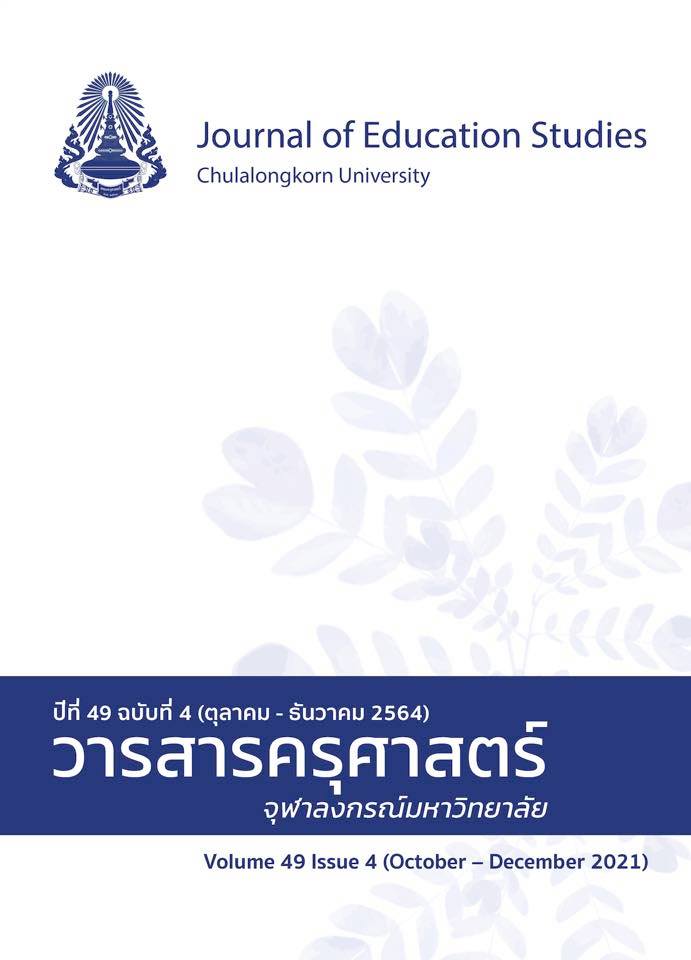A Study of the Efficacy of the Organizational Engagement Building Process of Staff toward the Office of Registration, Records and Evaluation, Sukhothai Thammathirat Open University
DOI:
https://doi.org/10.14456/educu.2021.65Keywords:
efficacy of process, organizational engagementAbstract
This research aimed to 1) study the efficacy of the organizational engagement building Process, and 2) suggest guidelines for improving, developing, and building staff engagement of the office. The sample of the study were 117 staff of the Office of Registration, Records and Evaluation, Sukhothai Thammathirat Open University, and 18 staff members who were responsible for human resource development. The instruments of the study were questionnaires and brainstorming forms. The data were analyzed using mean, standard deviation, and content analysis. The results were concluded as follows: 1) In terms of the importance of the efficacy of the organizational engagement building process, overall, the most important issue was that the staff were proud to work for the organization. The most notable operational result was that the staff clearly understood their own roles and responsibilities. The results from the comparison between the importance and operational results showed that the highest Gap Score was the working condition which created a work-life balance. 2) In terms of guidelines for building staff engagement, it was suggested that the organization hold an idea sharing meeting between senior and junior staff, career growth be taken care of, and happiness in the workplace be promoted. The organization should also encourage staff to have an opportunity to learn and develop new skills through online channels and award and express appreciation to staff who demonstrated outstanding performance. In addition, the organization should increase and vary its internal communication channels
References
จิระพงค์ เรืองกุน. (2556). การเปลี่ยนแปลงองค์การ : แนวคิด กระบวนการ และบทบาทของนักบริหารทรัพยากรมนุษย์.
วารสารปัญญาภิวัฒน์, 5(1), 194-202.
เจริญจิตร เศวตวาณิชกุล. (2560). การสร้างความผูกพันของพนักงาน : กรณีศึกษาโรงงานประกอบรถยนต์ในประเทศไทย
[วิทยานิพนธ์ปริญญาดุษฎีบัณฑิต ไม่ได้ตีพิมพ์]. มหาวิทยาลัยธุรกิจบัณฑิตย์.
ธัญนันท์ วีรภัทรรุ่งโรจน์. (2559). ลักษณะความแตกต่างระหว่าง Generation X, Y และ Z ในกรุงเทพมหานคร และ
พฤติกรรมในการสั่งซื้อสินค้าออนไลน์ [การค้นคว้าแบบอิสระมหาบัณฑิต ไม่ได้ตีพิมพ์]. มหาวิทยาลัยเนชั่น.
ปณิธาน จิยะจันทน์. (2559). การพัฒนาทรัพยากรบุคคลกับความผูกพันต่อองค์กรของบุคลากรสายสนับสนุนวิชาการ
มหาวิทยาลัยเกษตรศาสตร์ วิทยาเขตกำแพงแสน จังหวัดนครปฐม [วิทยานิพนธ์มหาบัณฑิต ไม่ได้ตีพิมพ์].
มหาวิทยาลัยศิลปากร
พิชิต พิทักษ์เทพสมบัติ. (2552). ความพึงพอใจในงานและความผูกพันต่อองค์การ ความหมาย ทฤษฎี วิธีวิจัย การวัดและงานวิจัย. เสมาธรรม.
ไพลิน เม้ยขันหมาก. (2559). การสื่อสารขององค์กรเพื่อสร้างความผูกพันของพนักงาน กรณีศึกษาบริษัท แพลน บี มีเดีย
จำกัด (มหาชน) [วิทยานิพนธ์ปริญญามหาบัณฑิต ไม่ได้ตีพิมพ์]. สถาบันบัณฑิตพัฒนบริหารศาสตร์.
รังสรรค์ ประเสริฐศรี. (2548). พฤติกรรมองค์การ. ซีเอ็ดบุ๊คเซ็นเตอร์.
สถาบันเพิ่มผลผลิตแห่งชาติ. (2557). เอกสารแบบประเมินประสิทธิภาพของกระบวนการสร้างความผูกพันกับองค์กร.
(ม.ป.ท).
สวนีย์ แก้วมณี. (2549). ความผูกพันต่อองค์การของพนักงาน. วารสารการบริหารสำหรับนักบริหารงานบุคคลมืออาชีพ,
27(3), 10-16.
สุพาภรณ์ รัตนะราช. (2562). ความสัมพันธ์ระหว่างความสุขในการทำงานกับความผูกพันองค์กรของบุคลากรสายสนับสนุน
ในมหาวิทยาลัยเทคโนโลยีราชมงคลส่วนกลาง [วิทยานิพนธ์มหาบัณฑิต ไม่ได้ตีพิมพ์]. มหาวิทยาลัยเทคโนโลยีราช
มงคลกรุงเทพ.
สุลีวัลย์ หมีแรตร์. (2559). ความสมดุลระหว่างชีวิตและการทำงาน แรงจูงใจในการเข้าสู่อาชีพและวัฒนธรรม องค์กรที่ส่งผล
ต่อความผูกพันกับองค์กรของพนักงานบริษัทเอกชนในกรุงเทพมหานคร [การค้นคว้าอิสระมหาบัณฑิต ไม่ได้ตีพิมพ์].
มหาวิทยาลัยกรุงเทพ.
อรฉัตร วรรณวิจิตร. (2561). การศึกษาความผูกพันต่อองค์กรของพนักงานมหาวิทยาลัยแม่ฟ้าหลวง [การค้นคว้าอิสระ
มหาบัณฑิต ไม่ได้ตีพิมพ์]. มหาวิทยาลัยแม่ฟ้าหลวง.
ภาษาอังกฤษ
Gibson, J. L., Ivancevich, J. M., & Dennelly, J. H. (1997). Organizations: Behavior, structure, process
(9th ed.). McGraw-Hill.
Holbeche, L. (2005). The high performance organization: Creating dynamic stability and sustainable
success. Elsevier/Butterworth-Heinemann.
Parasuraman, A., Zeithaml, V. A., & Berry, L. L. (1985). A conceptual model of service quality and its
implications for future research. Journal of Marketing, 49, 41-50.
Steers, R. M. (1991). Introduction to organizational behavior. Harper Collin.
Wellins, R. S., Bernthal, P., & Phelps, M. (2005). Employee engagement: The key to realizing competitive
advantage. Development Dimensions International.
Downloads
Published
How to Cite
Issue
Section
License

This work is licensed under a Creative Commons Attribution-NonCommercial-NoDerivatives 4.0 International License.




